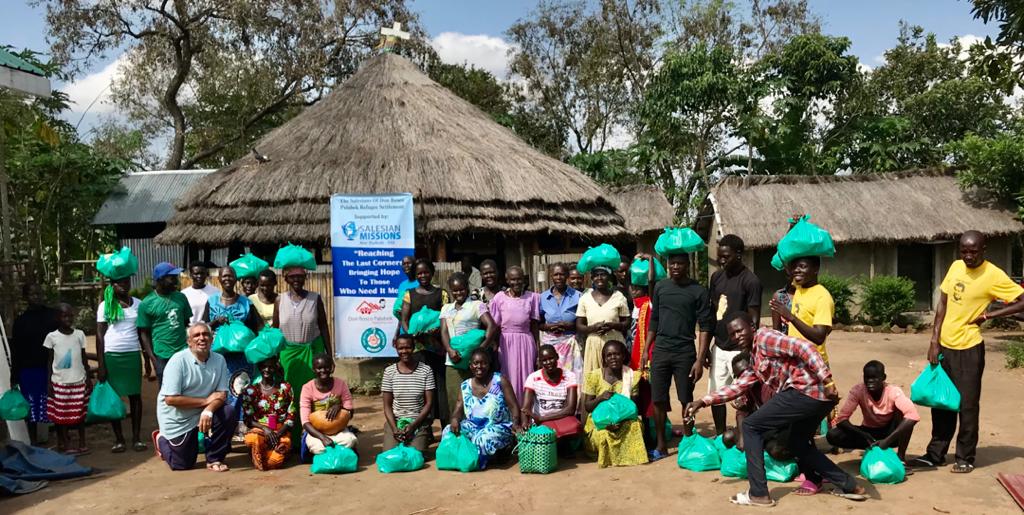
GLOBAL: ‘Hunger is rising, COVID-19 will make it worse,’ says global report
Salesian Missions provides food relief, clean water around the globe to help address crisis.
NEW ROCHELLE, NY (Jan. 13, 2021) Increasing hunger—made worse by COVID-19—is one of the serious challenges facing the world this year, according to the Global Humanitarian Overview 2021 from the United Nations Office for the Coordination of Humanitarian Affairs (OCHA).
“By the end of 2020, the number of acutely food insecure people could increase to 270 million due to COVID-19, representing an 82 per cent increase compared to the number of acutely food insecure people pre-COVID-19,” says the OCHA report, published in December 2020.
Overall, nearly 690 million people are hungry, according to the Food and Agriculture Organization of the United Nations (FAO). This is up 10 million people since 2019. FAO reports the COVID-19 pandemic could add between 83-132 million people to this number, depending on the economic growth scenario.
Humanitarian agencies are warning that urgent action is needed to slow levels of hunger, starvation, malnutrition, stunting and anemia—particularly among children.
In addition, the OCHA report highlighted the critical need for clean water, saying, “approximately 1.3 billion people, including 456 million children, suffer from high or extremely high water vulnerability.”
Around the globe, Salesian missionaries and Salesian Missions, the U.S. development arm of the Salesians of Don Bosco, work to provide food programs and clean water access to support the most vulnerable populations, improve household food availability, increase agricultural productivity and ensure clean water access.
Refugees receive food aid, support for agriculture efforts
Even before COVID-19, living conditions for refugees and asylum seekers at Palabek Refugee Resettlement Camp in Uganda were not easy. But with the pandemic, hunger has become a more severe issue—as the amount of food delivered monthly to refugees has been reduced by 30 percent.
Palabek is home to more than 56,000 refugees and asylum seekers, and several agencies are involved in providing food and education.
While some agencies have left because of the pandemic, Salesian missionaries have remained—most recently providing food aid to 800 people at the camp. With support from Salesian Missions, Salesian missionaries made and distributed bags with food.
In addition to providing food directly, Salesian missionaries are working to counter the food shortage through the cultivation of food including cereals, vegetables, and if possible, cash crops such as sim sim, groundnuts and sunflowers. The goals are to promote kitchen gardens of vegetables and fruits, hire land from the local Ugandans, and create agreements to work together with the host community. Salesian missionaries have provided several hundred kilos of maize, beans, soya beans, sim sim, groundnuts and many assorted vegetable seeds. They have also provided tons of cassava cuttings.
Migrant workers face hunger with loss of jobs
In India, migrant workers and other day laborers are dealing with a loss of their informal employment due to the pandemic and national lockdown. As a result, many migrants were stranded in cities and unable to buy food for their families.
Salesian missionaries with Don Bosco Konkan Development Society in Goa provided more than 50,000 people with nutritional support thanks to donors, including funding from Salesian Missions. While Goa faced food scarcity, Salesian missionaries were able to secure rice and other rations from sources in Maharashtra, as well as local suppliers.
As the crisis continued in Goa, there was an exodus of migrant workers back to their villages. To help them, camps were set up for them to stay while trains took them back home. Don Bosco Konkan Development Society provided cooked food for migrants for their stay in the camps and provided 5,500 food packets for them to take on their travels. Don Bosco Childline South Goa distributed biscuits and water at the railway station.
Feeding programs support children returning to school
Worldwide, many children are not only missing out on their education but also suffering from hunger due to a lack of critical school feeding programs. As schools reopen, Salesian missionaries are providing food programs to ensure children are fed.
Salesian Missions promotes feeding programs in schools and centers through partnerships with organizations such as Rise Against Hunger, an international relief organization that provides food and life-changing aid to the world’s most vulnerable. Salesian Missions identifies needs and coordinates delivery of 40-foot shipping containers full of meals and supplemented with additional supplies when available.
In 2019, Salesian Missions helped ensure the safe delivery and distribution of more than $6 million worth of food assistance, medicine, and other supplies and equipment donated by partner organizations.
Clean water is priority
UN-Water notes that more than 700 children under 5 years of age die every day from diarrheal disease linked to unsafe water and poor sanitation.
The Salesian Missions “Clean Water Initiative” is making building wells and supplying fresh, clean water a top priority for every community in every country in which Salesian missionaries work. Clean water access will promote proper hygiene, provide safe water for drinking and cooking, and improve health conditions for those in local communities.
Most recently, five communities in Nigeria have clean water access thanks to donor funding through the “Clean Water Initiative.” Borehole projects have been completed in Alaenyi, Umuaju, Bagbe, Nsasak Afaha and Neke. Due to geographic conditions, there is very little potable water in this region, and people—mostly women and children—were forced to travel long distances to access clean water for their daily needs or rely on rain and river water, which can sometimes be contaminated.
###
Contact: media@salesianmissions.org
